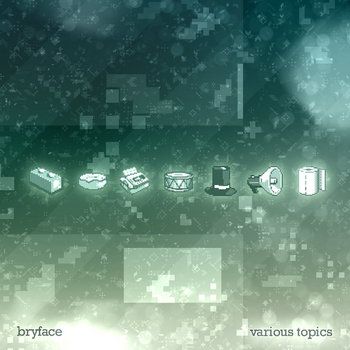With
Andrew Kilpatrick gallivanting across Europe, Bertrand
Guérin-Williams has stepped up to review the upcoming double album
release by Auxcide (the first part of which comes out later today). Taking the position flawlessly, TWG are very grateful and excited to introduce our first guest review (in what will hopefully be a long line!)
~~~~~~~~~~~~~~~~~~~~~~~~~~
Auxcide
has been busy since December. For Omnia,
his latest release, he’s written two albums’ worth of fairly
consistent material acting as a soundtrack for a fictional video
game. Within, Bryan Dobbins, aka Auxcide, throws his hat in the
already overflowing chip/VGM ring with as much flair as he can
muster.
The
clear focus on thematic melodies, leitmotifs, and a healthy dosage of
grandeur lends itself to this album’s structure due to its
positioning as a soundtrack. As with past releases, Auxcide utilizes
a narrative-grouping structure to order tracks. For instance, the
smooth transitions between the first three and last two tracks allow
for some awe-inspiring moments in the songs they lead into. The
sweeping, introductory duo of 'Past Beginnings' and 'The Not So
Distant Memory' crash into the bass and percussion hits of 'Deep
Space Drifting' to create a powerful opener. It works as a reminder
that, though Omnia
is a 'soundtrack,' Auxcide is still writing the music with all the
typically lavish trappings his style usually employs. 'Starship Nova'
and follow-up 'Horizon Line' both exemplify this; they’re
thematically tied to the songs around them, but retain the
danceable-yet-intense nature of Auxcide's previous work. The rhythms
and memorable solos draw the listener in; most notable are the slow,
steady melodies in 'Spectrum' that soar above pulsating backgrounds
or the searing main synth that counterbalance the cathartic rise and
fall of chords in 'Omnia' in hypnotic fashion.
Omnia's
striking melodies show Auxcide's progress from his previous double
release SPECK/PIXEL, and EP [Dimensions]. Whereas his original songs
there sounded relatively similar, many on Omnia
have distinct melodic and stylistic differences. Nowhere is this
contrast more obvious than in the format change between discs. For
the first disc, Dobbins uses three copies of LSDJ on GBA SPs
MIDI-synced with synths, a drum machine, and an effects pad. However,
the second disc brings the power of LSDJ and his composition skills
to the fore. Stripping out the synths in Gameboy-only tracks on the
second disc like “Horizon Line” show off effective use of LSDJ’s
limited track economy and the wide variety of textures and sounds he
can pull out of LSDJ.
The
frenzied nature of his music has drawbacks, though. Like SPECK and
PIXEL, after listening to this album for a while, the distorted
sounds Dobbins often uses begin to grate. While he does allow respite
in songs like 'Nihil,' the abrasive noise and WAV channel instruments
characteristic of his sound, doubled with the album length,
eventually wear. So too does the somewhat repetitive nature of his
sound; reliance on danceable, recursive styles in rhythms and
thematic 16th-note arpeggios becomes glaringly apparent after a
while. Since this is a faux-soundtrack, similarities between some
songs are inevitable, but the fact that Dobbins isn’t more eclectic
with his track listing is becoming a trend following the release of
two double albums in a row.
This
problem is particularly evident in his choice to leave in the
middling song 'Second Strike'. The song is short enough to be
inoffensive, but it doesn’t fit in the album's context, and is
especially out of place being surrounded by 'Horizon Line' and
'Nihil', two songs that follow the echoic, vast themes seen in almost
every other song on this album. 'Star-Crossed Stars' is another
questionable inclusion. The intro and bridge —though reminiscent of
older VGM’s simplicity—don’t follow the trend of the rest of
Omnia
which is built on taking old VGM tropes and fusing them with modern
dance conventions.
Omnia
moves away from these problems by experimenting with comparatively
unique sounds. 'Heavy Cannons' takes a deeper stab at hardcore and
progressive trance styles briefly flirted with on SPECK's 'Varia'.
While the emotive intro mimics piano, the bulk of the song churns and
roars like an army en route. In contrast, the 80s sci-fi noir,
Infinity Shred style of 'Starship Nova (Infinity Mix)' is an example
of where Auxcide could go next. Though not the album's best, it's an
interesting filter to hear Auxcide's typically chaotic style through.
Auxcide
does alleviate some of the repetition within songs with solos during
and melodic breakdowns between “looped” sections. Overall,
however, Omnia
sometimes falls into the same traps as his previous releases,
becoming repetitive over time. Don’t let the negatives scare you
away, though: a clearer focus on memorable, melodic songs and the
interesting new directions dabbled with carry this release. Everyone
will find more of what makes Auxcide great, and VGM composers should
take note of Omnia
as a varied and unique approach to the field.
Favourite track: Heavy Cannons
Grab part one of the release here.
Favourite track: Heavy Cannons
Grab part one of the release here.






















